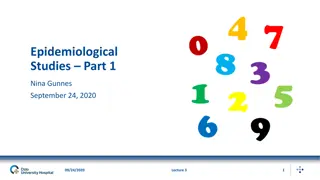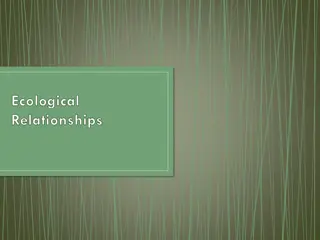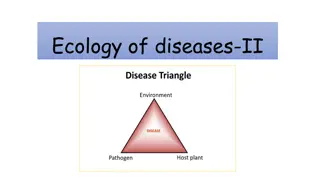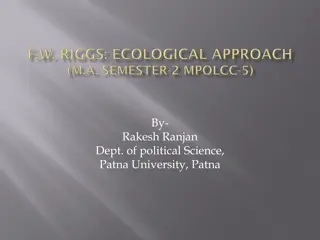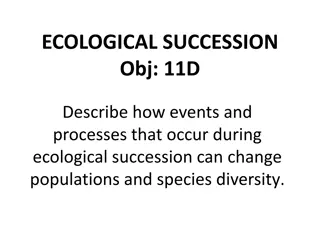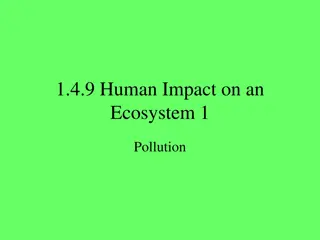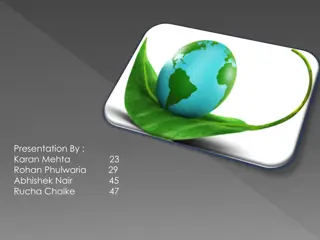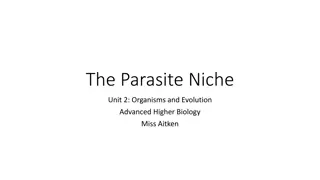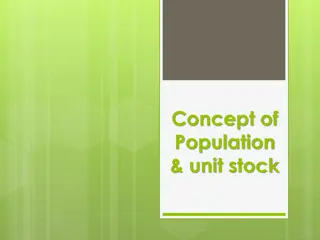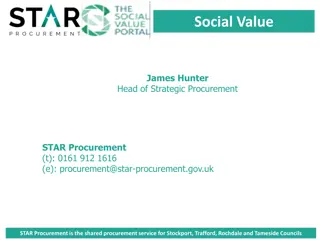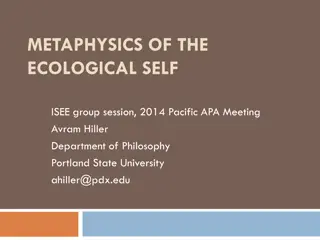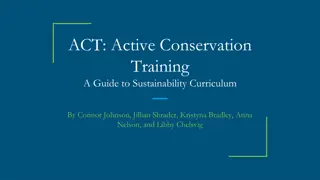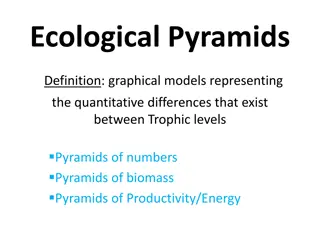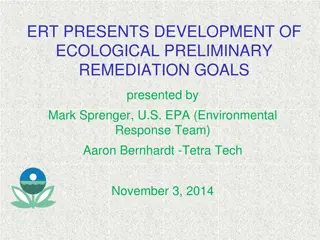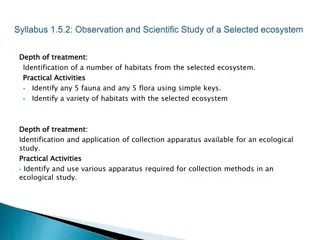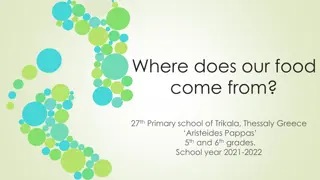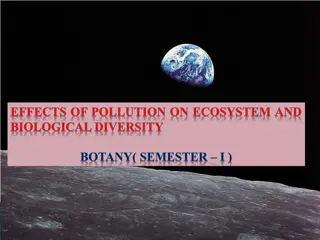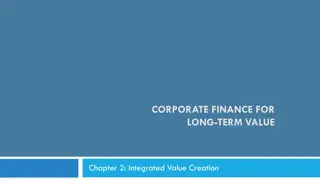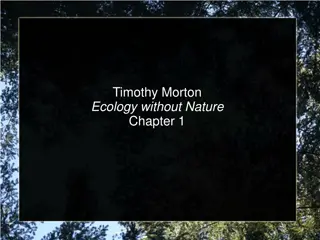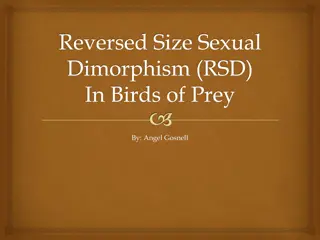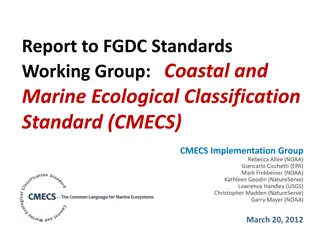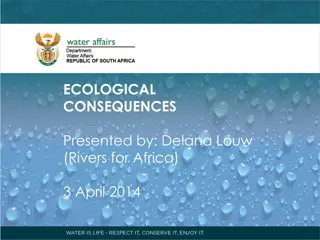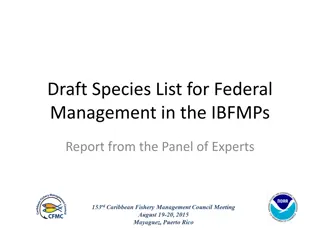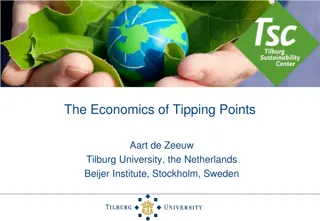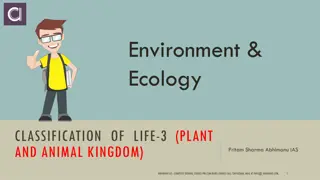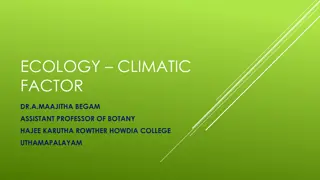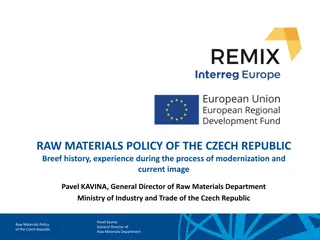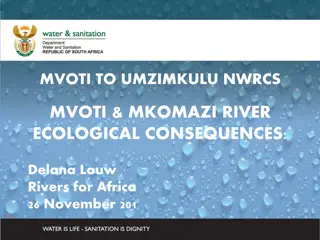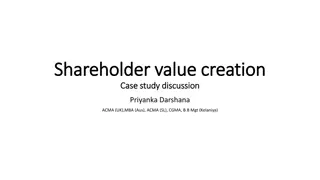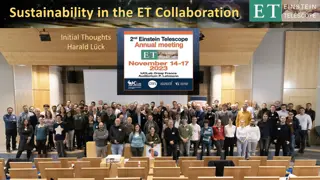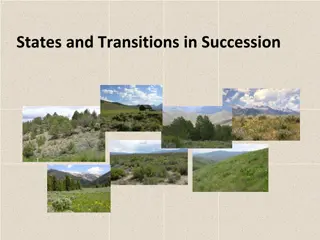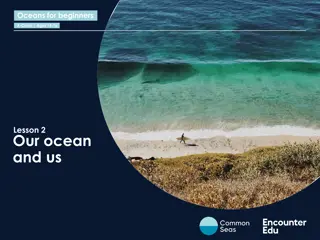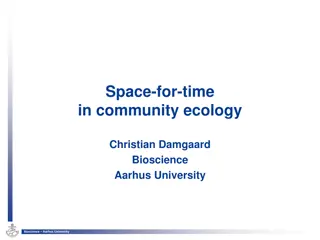ECC Social Value Reporting and Evaluation Framework
Essex County Council (ECC) has implemented a robust Social Value Reporting and Evaluation framework based on the Local Government Association's National TOMs method. This framework categorizes and assesses social value contributions in two parts - Value Score and Supporting Statement Score - to deri
3 views • 16 slides
Understanding Models with False Positive Detections in Occupancy Modeling
Explore the importance of addressing false positives in occupancy modeling, potential biases caused by them, methods to mitigate errors, and the extension of basic occupancy models to allow for false positives. Key concepts such as the Royle-Link model and the integration of classification processes
10 views • 33 slides
Overview of Ecological Studies in Epidemiology
Ecological studies in epidemiology involve studying groups of individuals at a population level to examine the correlation between exposure and disease occurrence. While cost-effective and useful for generating hypotheses, ecological studies have limitations, such as the inability to control for con
3 views • 21 slides
Understanding Ecological Relationships and Food Chains
Explore the intricate ecological relationships in nature, including population dynamics, producer-consumer systems, and different types of consumers like herbivores, carnivores, and decomposers. Learn about food chains, food webs, and the interconnectedness of organisms in ecosystems through informa
0 views • 38 slides
Understanding Ecosystems and Disease Ecology
Explore the diverse types of ecosystems, including autochthonous, anthropurgic, and synanthropic ecosystems, and their impact on disease ecology. Learn about biotopes, biocenosis, ecological mosaics, and ecological interfaces, and discover how infectious diseases can be transmitted across these inte
0 views • 10 slides
Understanding Landscape Architecture: Designing Outdoor Environments
Landscape architecture involves the art and practice of designing outdoor spaces to harmonize with buildings, roads, and natural surroundings. It is a comprehensive discipline that encompasses land analysis, planning, design, management, and preservation, creating healthy and enjoyable spaces for th
1 views • 23 slides
The Ecological Approach in Comparative Public Administration
Fred W. Riggs, a proponent of the Ecological Approach in Public Administration, emphasized the importance of understanding the interaction between administrative systems and their external surroundings. He introduced the Fused-Prismatic-Diffracted Model to explore the unique contexts of developing c
0 views • 21 slides
Understanding Ecological Succession and Its Impacts
Ecological succession is the orderly process of change in an ecosystem, where one community replaces another until a stable climax is reached. This progression affects populations and species diversity. The process involves primary and secondary succession, with events like tornadoes, hurricanes, an
0 views • 23 slides
Understanding Pollution and its Ecological Impact
Pollution is any human addition to the environment that disrupts the ecosystem's ability to sustain life. This includes pollutants like CO2 and chemicals from various sources that harm air, water, and land. Different types of pollution such as industrial, agricultural, and domestic pollution have ad
0 views • 25 slides
Understanding the Relationship Between Ecology and Business
Ecology and business have a complex relationship where human activities impact the ecological environment, and in turn, the environment influences our quality of life. Maintaining ecological balance is crucial for sustainable development, and businesses play a significant role in ensuring environmen
0 views • 19 slides
Understanding Ecological Niches in Advanced Biology
In Advanced Higher Biology, the concept of ecological niches is explored in depth, considering both abiotic and biotic factors that impact an organism's role in its environment. The fundamental and realized niches are distinguished, along with the Competitive Exclusion Principle and examples like sq
4 views • 18 slides
Understanding the Concept of Population and Unit Stock
The concept of population revolves around all organisms of the same species living in a specific area capable of interbreeding. It is essential to differentiate between sample populations and real populations to accurately study their attributes such as birth rates, death rates, and spatial dimensio
0 views • 15 slides
Enhancing Social Value through Strategic Procurement
STAR Procurement, the shared service for multiple councils, emphasizes the importance of Social Value in procurement practices. The Social Value Portal serves as a management tool to measure and demonstrate the benefits of Social Value commitments. Bidders are required to provide quantitative and qu
0 views • 14 slides
Metaphysics of the Ecological Self and Monism in Philosophy
The discussion explores the concept of the ecological self in deep ecology and the interplay with contemporary analytic philosophies like monism. It proposes a moderate view that acknowledges internal dependence relations between humans and the environment, grounding normative claims about human-env
2 views • 29 slides
Interactive Sustainability Curriculum for Conservation Training
Engage students in activities focusing on energy, agriculture, waste management, animals and ecosystems, consumption, and other sustainability topics. Lessons include understanding energy sources, land degradation, waste sorting, nature walks, tote bag making, and ecological footprints. Encourage cr
0 views • 7 slides
Understanding Ecological Pyramids: Models of Trophic Relationships
Ecological pyramids are graphical models that depict quantitative differences between trophic levels in an ecosystem. They come in three types: Pyramids of Numbers, Pyramids of Biomass, and Pyramids of Productivity/Energy. Pyramids of Numbers show the number of organisms at each trophic level, Pyram
0 views • 4 slides
Understanding Energy Flow in Ecosystems: A Visual Guide
Explore the intricate dynamics of energy flow in ecosystems through a collection of visually engaging images depicting autotrophs, heterotrophs, food chains, ecological pyramids, and more. Dive into the concept of trophic levels, food webs, and feeding relationships, unraveling the journey of energy
0 views • 13 slides
Eco-Remediation Goals Development Training Overview
This presentation by Mark Sprenger from the U.S. EPA discusses the development of Ecological Preliminary Remediation Goals (PRGs). It covers the process steps, assumptions, risk information activities, and resources related to ecological risk assessment within the EPA's programs. The training module
0 views • 53 slides
Enhancing Ecological Sustainability through Gamified Machine Learning
Improving human-computer interactions with gamification can help understand ecological sustainability better by parameterizing complex models. Allometric Trophic Network models analyze energy flow and biomass dynamics, but face challenges in parameterization. The Convergence Game in World of Balance
0 views • 12 slides
Understanding Ecosystems and Habitat Identification Through Practical Activities
Explore the dynamic interaction between organisms and the environment in various ecosystems through practical activities like identifying habitats, fauna, and flora using simple keys. Learn how to use collection apparatus for ecological studies and create keys to classify different objects and organ
0 views • 14 slides
Understanding the Ecological Impact of Food Production and Consumption in Greece
Our food comes from various sources, and it's essential to consider its ecological footprint on the environment. Through research conducted by the 27th Primary School of Trikala, Thessaly, Greece, valuable insights were gained about the origin and buying preferences of Greek families regarding food.
0 views • 31 slides
Understanding Biological Diversity and Ecological Organization
Exploring the intricate balance of flora and fauna on our planet, this content delves into the vast array of plant and animal species coexisting in various ecosystems. It discusses the significance of biodiversity, the interaction of biotic and abiotic components in ecological systems, and the ecolo
0 views • 41 slides
Integrated Value Creation in Corporate Finance
Explore the concept of integrated value creation in corporate finance, emphasizing the importance of managing for long-term value while incorporating social and environmental goals. Learn about responsible management practices that focus on creating net present value (NPV) through a balance of finan
0 views • 38 slides
Rethinking Ecology: Nature's Role in Human Society
Timothy Morton's "Ecology without Nature" challenges the traditional concept of "nature" and its interference with ecological progress in society. Through thought-provoking narratives and philosophical perspectives, Morton argues for a reevaluation of our relationship with the environment, emphasizi
3 views • 23 slides
Understanding Reversed Size Sexual Dimorphism in Birds of Prey
Reversed Size Sexual Dimorphism (RSD) in birds of prey challenges the traditional norm where females are larger than males. This phenomenon can be advantageous to both sexes in terms of ecological niche partitioning, role differentiation, and behavioral adaptations. The study focuses on the Strigifo
0 views • 14 slides
Coastal and Marine Ecological Classification Standard (CMECS) Implementation Progress
The report highlights the development, timeline, objectives, and importance of the Coastal and Marine Ecological Classification Standard (CMECS) along with its implementation progress. It discusses the need for a national standard for classifying coastal and marine habitats, the objectives of CMECS,
1 views • 38 slides
Understanding Environmental Hazards and Management
Exploring major hazards management, geology perspectives, ecological concepts, natural environmental hazards, classes of natural hazards, and introduction to environmental hazards management. The content covers ecological levels, abiotic factors, biomes, environmental degradation, and more.
0 views • 10 slides
Understanding Ecological Consequences in Ecosystem Management
Delana Louw from Rivers for Africa presented on the ecological consequences of various scenarios in ecosystem management. The process involves delineating units of analysis, stakeholder engagement, quantifying ecological water requirements, evaluating scenarios, and determining management classes. B
0 views • 14 slides
GLRI Ecological Focus Workgroup and Related Charge Questions
The GLRI Ecological Focus Workgroup, comprised of members like John Hull, Dr. Val Klump, Kay Nelson, and Steve Galarneau, focuses on issues such as AOC remediation, invasive species control, nutrient reduction, and habitat restoration in the Great Lakes region. The workgroup addresses key questions
0 views • 13 slides
Draft Species List for Federal Management in IBFMPs Report
Panel of Experts was tasked with developing a draft list of species for federal management in Island-Based Fishery Management Plans (IBFMPs). Approaches outlined for selecting species include considering factors like species occurrence in State waters, stock status, ecological importance, and econom
0 views • 27 slides
Understanding Tipping Points in Ecological and Economic Systems
Delve into the complex dynamics of tipping points in ecological systems such as insect outbreaks, eutrophication of lakes, and bleaching of coral reefs, as well as their economic implications. Explore the interactions between human behavior and environmental factors, and the challenges in managing t
0 views • 29 slides
Classification of Algae, Economic, and Ecological Significance, Bryophytes Overview
Algae, classified into green, brown, and red types, play crucial roles in food, industry, and ecology. Green algae are significant in symbiotic relationships, while red and brown algae provide commercial products. Algae are vital producers in aquatic ecosystems, contributing to ecological balance. B
0 views • 18 slides
Ecological Factors and Climatic Influences on Plant Life
Ecological factors play a crucial role in shaping the environment for organisms to thrive. This includes living (biotic) and non-living (abiotic) components like climatic factors, edaphic factors, topographic factors, and biotic factors. Climatic factors such as light, temperature, water, wind, and
0 views • 14 slides
Raw Materials Policy of the Czech Republic: History, Modernization, and Challenges
The Raw Materials Policy of the Czech Republic has undergone significant changes and challenges throughout its history. From the approval of the previous policy in 1999 to the recent modernization efforts in 2015, political and environmental factors have played a crucial role in shaping the current
0 views • 13 slides
Ecological Consequences Assessment for Conservation Areas
Determining the ecological consequences of various scenarios is crucial for conservation efforts. The assessment focuses on changes in geomorphology, physico-chemical properties, fish populations, macroinvertebrates, and riparian vegetation. By evaluating scenarios based on ecological significance,
0 views • 11 slides
Maximizing Shareholder Value Creation Through Strategic Business Practices
Explore the concept of shareholder value creation, the importance of generating revenues exceeding economic costs, and meeting shareholders' expectations. Learn about Economic Value Added (EVA), key value drivers, aligning strategy with value creation, and essential factors for overall business succ
0 views • 11 slides
Sustainability Challenges in ET Collaboration: Addressing Ecological and Non-Ecological Aspects
The ET Collaboration is realizing the importance of sustainability, encompassing ecological and non-ecological aspects. Issues include balancing energy consumption and hardware longevity, remote access possibilities, funding sustainability, social partnerships, and designing instruments with sustain
0 views • 5 slides
Understanding Plant Community Succession and Ecological Transitions
Explore the dynamic process of plant community succession, from pioneer stages to climax communities, and the intricate patterns of transitions in ecological systems. Discover the variability and stability of different states within ecosystems, highlighting the complexities of natural ecological dyn
0 views • 14 slides
Understanding Ecological Goods and Services from Our Oceans
Explore the importance of ecological goods and services provided by oceans in Lesson 2 of the Oceans for Beginners curriculum. Learn about the tangible products, benefits, and services derived from ocean ecosystems, and reflect on their significance. Understand the categories of ecological services
0 views • 15 slides
Understanding Space-for-Time Substitution in Community Ecology
Space-for-time substitution (SFT) is a method used to study slow ecological processes by assuming different sites are at various stages of development. This approach, famous for its role in ecological development, has been critiqued for its implicit use in testing hypotheses on ecological processes
0 views • 7 slides


